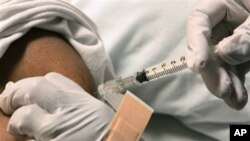A risky bone marrow transplant is often successful in treating children with sickle cell disease, a genetic disorder primarily seen in people of African descent.
Experts say by the time patients reach adulthood, however, they are usually too sick to withstand the rigorous procedure.
But now researchers say they are able to reverse sickle cell disease in adults using a less intensive bone marrow transplant.
According to John Tisdale, an investigator with the National Institute of Diabetes and Digestive and Kidney Diseases in Bethesda, Maryland, researchers performed a partial bone marrow transplant on 30 adult patients with severe disease, all of whom had a sibling with matching immune characteristics act as a donor.
The new procedure, which destroyed only 30 to 50 percent of a given patient's marrow, effectively cured 26 of the patients.
“Using this less toxic way of preparing a patient for a bone marrow transplant had success rates that were comparable to the more toxic kind of transplant that’s performed in children," Tisdale said.
After one year, doctors were able to take half of the adult patients off medication that suppressed their immune systems as their bodies began producing healthy red blood cells.
Juliana Ejedoghaobi, who received bone marrow from her older sister, says she feels a lot better now.
“I do get pain, but it is not compared to what I used to have before,” she said
The partial bone marrow transplant for adult sickle cell patients was described in the Journal of the American Medical Association.




